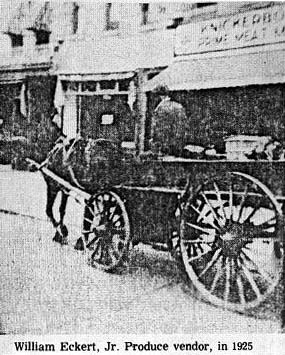The Civil War, called the Great War by historians, was the bloodiest, most inhuman conflict in our nation's history. During the war (1861 – 1865) over a half million American lives were lost in battles.
Our town had its share of heroes and veterans who came home after the war to take up life in the new more industrialized society that bad developed during the years of conflict.
But there were some veterans whose services to the union went unnoticed, and seemingly unappreciated. William Eckert was one of these men. Due to the nefarious practice of substitution, a method by which the wealthy could escape their military duty, many a young boy went to war during the conflict. William Eckert was the son of Andrew and Louise Eckert w'ho had immigrated from Germany in the early 1800's. At the age of 14 William joined the Union Army by taking the place of a wealthy man named Henry Bloss. For this service, which at that time was a common practice in both the north and south, Eckert. was paid $300. He became a private in Company F of the 6tb Regiment Maryland Infantry.
Because of this substitution, William Eckert was known to the Government by another name for most of his life, and he experienced great difficulty in obtaining his Civil War veteran's pension which he didn't begin to receive until he was 75 years old.
On April 6, 1865 William was wounded at Saylor Run or Saylor Creek in Virginia (the area was called Run by the northerners and Creek by tbose in the south.) He had the privilege of shaking hands with President Abraham Lincoln who was visiting the hospital where the young soldier was recovering.
After the war Eckert moved to Colorado before it became part of the United States. While there, Eckert met and rode with Buffalo Bill Cody. It was also beleived from accounts that Eckert rode with the Pony Express. A short time later~ Eckert worked in a lumber camp or mill where his left arm became infected and had to be removed.
Eckert later met and married Rebecca Collins, a young woman from Princess Anne County in Virginia. His wife was the daughter of Sarah Hodges, a descendant of the Snake Tribe of the American Indians.
The Eckerts had two sons who with their father eventually started a fruit and vegetable business in the Maspeth area. The business used horses and wagons to deliver their produce.
The produce wagon was a familiar sight rolling slowly along the dirt, roads, welcomed by the housewife who made her purchases from the selection of fresh fruit and vegetables shown her by the vendor. Later on when William Eckert, Jr. had the business, Donald Steinmaker often accompanied his grandfather on his rounds by horse and wagon.
Few people knew William Eckert as a boy who went to war in another's place, but his was a familiar face to the housewives of Maspeth many years ago, just as his son William Eckert, Jr. was well known to the townspeople later on.
Years ago there were no supermarkets. For meat you went to the butcher. If you sent your children, they would get a slice of bologna from the butcher. If you sent your son or daughter to the bakery, they would get a piece of spice cake.
And for fruits and vegetables, the peddlers would come around each day with horse and wagon. The peddler usually yelled out loudly whatever he had for sale. When he had a wagon full of cabbages held yell “Cabbage: Two cents a head'.” He would sell out the whole load in a day. Many, if not, all, of the people of Middle Village and Maspeth made their own sauerkraut and would buy twenty-five or more heads of cabbage for this purpose. The same was true of string beans and potatoes.
People made their own grape jelly and other preserves. In those days there was no ready ground coffee in jars. Whole coffee beans were bought and ground for you by the grocer if you didn't have your own grinder at home. Any family ran out, of wood or coal for their stove would purchase some at the grocery.
Not, too long ago, Donald Steinmaker, a Maspeth resident, joined the New York based Oliver Tilden Camp #26 and he is a member of the Sons of Union Veterans of the Civil War, thanks to his great grandfather. The members often dress in Civil War attire, but they are not reenactors like other groups. This group is a national organization charted by Congress and each of the members is required to be a direct descendant of a Civil War soldier.
The original Sons of Union Veterans of the Civil War was established in 1881. The Tilden Camp, where Steinmaker is a member, began in 18F4 and is the last camp in the New York downstate area. The Sons of Union Veterans of the Civil War have nearly 6,000 national members. Commander George J. Weinwann is the present. Commander, while Cliff Henke was the past Commander.


